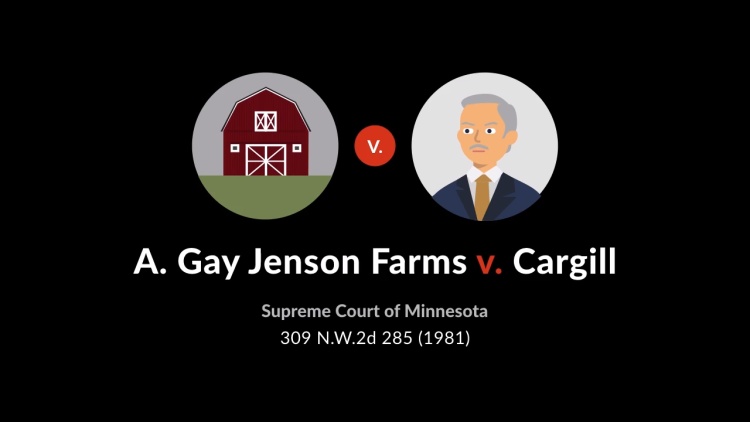A. Gay Jenson Farms Co. v. Cargill, Inc.
Minnesota Supreme Court
309 N.W.2d 285 (1981)
- Written by Ronald Quirk, JD
Facts
Warren Grain & Seed Co. (Warren), an agricultural company that operated a grain elevator, contracted with several local farmers (plaintiffs) to purchase grain for resale. In 1964, Warren sought financing for working capital from Cargill (defendant). The parties executed a security agreement under which Cargill would loan money to Warren on “open account” financing with a limit of $175,000 and Warren would receive funds and pay expenses through drafts drawn on Cargill through Minneapolis banks. The drafts were imprinted with Warren’s and Cargill’s names. In exchange for the financing, Cargill became Warren’s grain agent, and Cargill was given right of first refusal to buy grain sold by Warren. In 1967, the parties executed a new contract that increased Warren’s credit line and gave Cargill authority over some of Warren’s internal operations, including requiring Warren to give Cargill annual financial statements, granting Cargill access to Warren’s books, and requiring Cargill’s approval before engaging in certain financial transactions. Cargill exercised its contractual authority and commenced a pattern of reviewing Warren’s finances and operations and making business recommendations to Warren. By the mid-1970s, Warren was shipping 90 percent of its grain to Cargill. Cargill later discovered that Warren was engaging in some questionable uses of funds, but instead of calling the loan, Cargill executed new security agreements with Warren, increasing its limit to $1,250,000. Warren’s debt later exceeded its credit line, and Cargill became increasingly involved with Warren’s finances, including keeping daily debit positions and opening a bank account in Warren’s name, funded by drafts drawn on Cargill through a local bank. Warren subsequently went bankrupt. The farmers who sold grain to Warren sued Cargill for recovery of $2 million, alleging that Cargill had acted as principal for the grain elevator and was thus liable for its agent Warren’s contractual obligations. At trial, the jury found in favor of the farmers.
Rule of Law
Issue
Holding and Reasoning (Peterson, J.)
What to do next…
Here's why 907,000 law students have relied on our case briefs:
- Written by law professors and practitioners, not other law students. 47,100 briefs, keyed to 996 casebooks. Top-notch customer support.
- The right amount of information, includes the facts, issues, rule of law, holding and reasoning, and any concurrences and dissents.
- Access in your classes, works on your mobile and tablet. Massive library of related video lessons and high quality multiple-choice questions.
- Easy to use, uniform format for every case brief. Written in plain English, not in legalese. Our briefs summarize and simplify; they don’t just repeat the court’s language.





